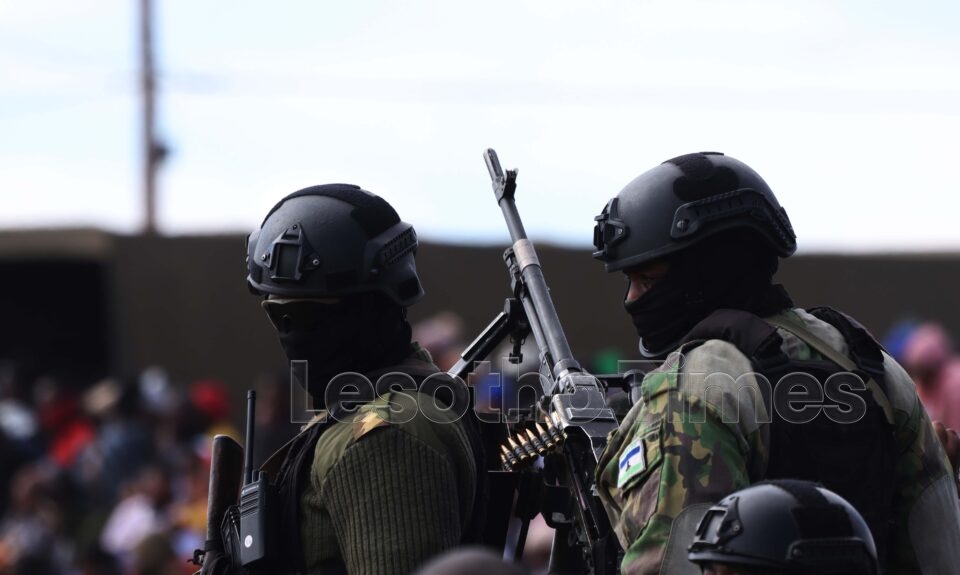…as police bungle investigations
…inept prosecution nails the case’s collapse
Moorosi Tsiane/Hopolang Mokhopi
GLARING fumbling by police investigators, coupled with inept prosecution, has let five soldiers charged with the April 2012 murders of three civilians in Mafeteng off the hook.
Thirteen years after Thabang Mosole, Monyane Matsie, and Pakiso Ntala Letatana, all of Ha Lepolesa in Mafeteng, were brutally gunned down, the five soldiers accused of their killings have been acquitted of all charges.
High Court judge, Polo Banyane, ruled that the Crown had failed to present credible evidence linking them to the murders.
The case — marred by contradictions, missing evidence, and investigative blunders — adds to a growing list of high-profile cases where justice for slain civilians has been compromised by systemic failure.
The killings
On 6 April 2012, Mosole, Matsie, and Letatana left Ha Lepolesa with two friends, Moloinyane Ratsebe and Ralinne Mokete, to buy alcohol in Mafeteng. The group ended up in a local bar where a dispute broke out between them and unknown men shortly after midnight.
By the next day, Mosole, Matsie, and Letatana were dead — gunned down in cold blood.
In the aftermath, five soldiers: Captain Litekanyo Nyakane, Lance Corporals Khauhelo Makoae and Sebilo Sebilo, and Privates Tšepo Tlakeli and Thebe Tšepe, were arrested and charged with their murder.
The trial collapses
After years of legal wrangling, the trial collapsed spectacularly on Tuesday this week when Justice Banyane ruled that the Crown had failed to establish even a basic case.
Crown Counsel Advocate Mosoeunyane Masiphole presented three post-mortem reports and called 11 witnesses but under cross-examination, the state’s case quickly unravelled.
Witnesses contradicted each other on critical points — including the type and colour of the getaway vehicle, the number of passengers, and the identities of those present.
“. . . So many crucial questions are left unanswered,” Judge Banyane lamented, noting that none of the testimonies placed the accused soldiers directly at the scene of the killings.
Investigative failures
The prosecution’s woes were compounded by glaring investigative blunders.
Superintendent Janki, the first state witness, told the court that 124 bullet jackets were collected from the crime scene — yet such evidence was never presented in court.
Even more damning, the firearms allegedly used in the shootings were never secured from the army for ballistic testing. Instead, police rushed to take shells for examination without the actual guns — a move the court dismissed as “equally unhelpful.”
“. . . Such evidence could easily have been finished by the examination of the gun and the relevant results gathered from such evidence, including the shells and spent bullets collected from the scene. But none of this was done. No explanation is furnished why the guns were not sent for ballistic testing,” the judge said.
The situation worsened when it emerged that correspondence between the then Commissioner of Police (COMPOL) and the Army Commander demanding the release of firearms was never presented in court. Neither was the Commissioner himself called to testify.
“The Commissioner of Police, according to this evidence, wrote to the Commander LDF to release the requested guns, but the army did not comply. Notably, again, the correspondence between COMPOL and the Commander LDF was not handed in evidence. Likewise, the then Commissioner of Police was not called to confirm the existence of such requests or a response, if any, from the Commander LDF.
“Moreover, none of the police officers who testified explained the legal steps, if any, they embarked on to secure the firearms suspected to have been used in the commission of the crime when they were met with the alleged resistance from the army. It appears then from their evidence that, instead of pursuing anything, at least as I’ve said, there’s no evidence suggesting that they did anything,” said Justice Banyane.
The Crown also failed to summon a key eyewitness who had phoned her husband in Bloemfontein during the shootings, saying she saw his car at Ha Motanyane.
Justice Banyane said that witness “could have been the one who saw what really happened during the alleged shooting”.
A weak prosecution
At one point, Adv Masiphole even attempted to withdraw from the case, but Justice Banyane compelled him to proceed. The result was a weak, disjointed prosecution that allowed the defence — led by heavyweights Adv Karabo Mohau KC, Zwelake Mda KC, Napo Mafaesa, and Maletsatsi Theoha-Kao — to argue successfully for the soldiers’ discharge under Section 175(3) of the Criminal Procedure and Evidence Act.
The verdict
In her ruling, Judge Banyane found the accused not guilty.
“I conclude that the accused persons have not been identified as the culprits in the perpetration of the crimes charged. In addition, the state adduced no evidence from which a reasonable conclusion that the accused are responsible for the death of the deceased may be drawn.
“In other words, no evidence, be it direct or circumstantial, connects the accused persons to the commission of the offence.
“I therefore conclude that there is no case upon which a reasonable man might convict the accused. In the result, the application for discharge of the accused persons succeeds. They are found not guilty and discharged.”
Similarly bungled prosecution
On 1 August 2025, Justice Mokhesi cleared former Military Intelligence director, Brigadier (Brig) Rapele Mphaki, in the brutal 16 May 2017 murders of three civilians, granting his application for discharge after the Crown closed its case.
The judge ruled that there was no evidence linking Brig Mphaki and seven other soldiers to the triple murder, leaving only Sergeant Lekhooa Moepi and Private Tieho Tikiso to answer the charges. Those cleared alongside Brig Mphaki are Major Pitso Ramoepane, Captain Mahlehle Moeletsi, Warrant Officer Liphapang Sefako, Lance Corporal Mahlomola Makhoali, Private Nthatakane Motanyane, Motšoane Machai, and Nemase Faso.
However, the Crown has since appealed Justice Mokhesi’s ruling and the matter is expected to be heard in the Court of Appeal session next month.

